For Polly Sweeney, public law is a compulsion. In her spare time, hears Eduardo Reyes, she scales different heights
BIOG
BORN
Bath, 1984
EDUCATION
University of Kent (LLB Law) 2003-2006; Bristol Law School (Legal Practice Course) 2006-2007
ROLES
Irwin Mitchell (trainee solicitor 2007-2009, solicitor and head of public law, Birmingham, 2009-2012, associate and head of public law, Bristol, June 2012-2016, partner 2016-2020)
Founding partner of Rook Irwin Sweeney – April 2020 (ongoing)
Chair of the Law Society’s Mental Health and Disability Committee – September 2019 (ongoing)
Law Society Accredited Legal Representative – Mental Capacity (Welfare) Scheme
KNOWN FOR
Assistant / Associate of the Year, Birmingham Legal Awards 2012
Solicitor of the Year, Bristol Law Society Awards 2014
Law Society Gazette Legal Personality of the Year 2020
It is towards the end of our interview that the conversation turns to Polly Sweeney’s idea of a relaxing activity. ‘I climb and hike… basically spending lots of time up mountains is usually where I am at the weekends and on my holidays.’ Does she have a favourite mountain? ‘I should probably say Everest because that was one of my biggest trips, to the Everest base camp… it was really beautiful, and Nepal is incredible,’ she replies. ‘I would say actually probably my favourite [place] would be… Snowdonia… it’s kind of the hilliest place near Bristol.’
Sweeney has been busy during the pandemic. In April 2020, while many firms were furloughing staff, she and two other Irwin Mitchell solicitors, Alex Rook and Anne-Marie Irwin, went ahead with plans to set up their own firm. Rook Irwin Sweeney focuses exclusively on public law and human rights.
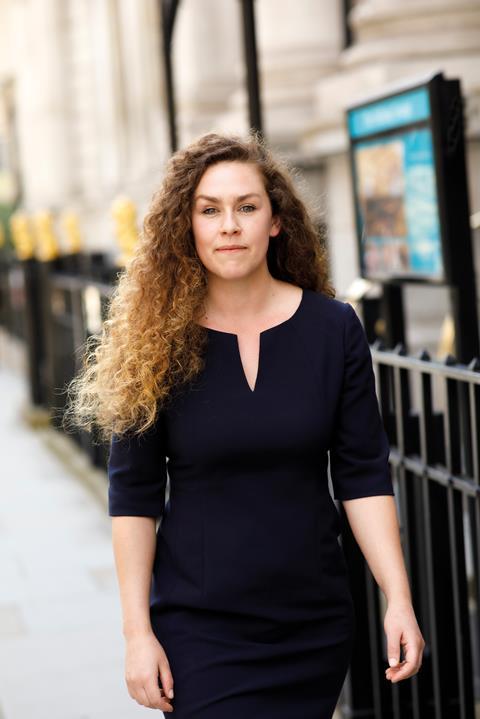
She talks about a ‘pretty unremarkable entry in the law’, but when she went from her local state school in Somerset to the University of Kent to read law she became the first person in her family to go to university.
Kent ‘was completely different to anything I’ve ever known growing up in a tiny little town in the countryside’, Sweeney recalls. ‘To suddenly be at university and to be able to debate and talk to people who shared my political values and ideas. It was really exciting, and I think from a very early stage I knew law was where I felt most comfortable.’
She also had jobs to pay her way through most of her studies, moving back to her parents’ home while doing her LPC at Bristol. ‘Decisions were partly led by where I could afford to live,’ she adds.
Securing a training contract with Irwin Mitchell, she ‘embarked on a country-wide tour of doing law’ – Newcastle, London, Sheffield, qualifying in Birmingham.
‘I think it was quite overwhelming,’ Sweeney reflects. ‘It was a really big firm, but I found my little place in the public law team. I found a little family there of people who were really supportive and encouraging and had lots of incredible role models.’
Was there a moment that settled her on public law? ‘I acted on a judicial review against the decision of the NHS to refuse a life-saving cancer drug for a man called Colin Ross,’ she says. ‘We had acted on the case when I was in Newcastle and we went to the Royal Courts of Justice for the handing down of the judgment, and the client was too poorly at the time to attend the hearing. So, he was in a hotel room just around the corner, and we went and had to sit on his bed and tell him that we had got him his life-saving cancer drug. I just remember thinking, “this is really, really important”. My supervisor at the time, Yogi Amin, said to me as we were leaving the hotel room, “You’ll never do anything else after this”… After that case, I knew that I couldn’t do another area of law.’
As a trainee, Sweeney also recalls working with criminal lawyers, visiting high-profile offenders in prison, and further medical treatment cases, again working with Amin. ‘I got exposed to a lot of really important cases at a very junior stage of my career,’ she says. ‘I think that, particularly as a legal aid lawyer, you often end up having a huge amount of responsibility at an early stage. I was running really important, high-profile cases when I was only one- or two-years’ qualified.’
Still fairly junior, in PQE at least, she acted in a judicial review against Birmingham City Council’s decision to downgrade eligibility for social care. ‘It was a national news story and we were successful in overturning the decision. It meant that many thousands of people in Birmingham were able to keep their social care.’
'I look back to a very early stage of my career, there was almost no discussion around mental health and wellbeing of solicitors at all. People wore their busyness as a badge of honour. Particularly, I think, for public lawyers, there is a tendency that you’ve got to be busy to be good at what you do'
Rook Irwin Sweeney is, in fact, the third public law practice she has set up. Newly qualified, she established a public law team in Irwin Mitchell’s Birmingham office. She then did the same in Bristol, growing its public law headcount to 12. Sweeney became a partner – at 31, one of the firm’s youngest.
An area where Sweeney has made a very public name for her practice is special educational needs and disability (SEND). As the Gazette has reported, local authorities are often willing to incur significant legal costs defending decisions not to assess children who may need extra support, or for failing to provide or fund necessary services. The website Special Needs Jungle estimated local authority legal spend at the SEND Tribunal was £40m in 2018/19, with official figures showing LAs lose 92% of such cases.
Sweeney’s experience has shown her that when it comes to SEN law, ‘we’re working within a system which is fundamentally broken, and I think that’s really hard for clients. As a lawyer you’re trying to manoeuvre through a system in crisis and do the very best job you can for your clients, but ultimately through those individual cases you’re never really going to change that system.’
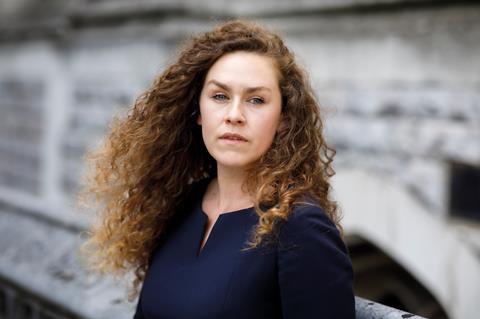
The cases she saw ‘were often driven by budgetary constraints of local authorities, and a lot of the time you could see there was just a very obvious legal answer, and there was obvious legal error or obvious legal breaches, but parents didn’t have the legal knowledge, and that’s really frustrating’.
A single letter of claim, she reflects, could reverse a local authority decision: ‘But it shouldn’t have to be like that. It shouldn’t be parents having to resort to lawyers sending a letter for claim. Parents will come to me and their children will have been out of school for perhaps 18 months, and have had no educational provision during that time, and within seven days of sending a letter there’s an education package in place.’
Sweeney devotes time to public legal education, ‘training families, parents and frontline advocates to support families in asserting their own legal rights’. She adds: ‘One of the biggest challenges in this area of law… is there just aren’t enough lawyers to represent the scale and number of families and children that need representation.’
She says the shortage is ‘largely because of the cuts to legal aid, and it’s completely decimated the practice space in this area. So, there’s now just a complete loss of skill and expertise. [Most] of the lawyers that used to do legal aid work have just gone now’. (Sweeney and other Rook Irwin Sweeney solicitors are also consultants at Scott-Moncrieff, which has a legal aid contract.)
Public education work is carried out with small grassroots charities and better-known national charities like Contact a Family and the National Autistic Society. Sweeney says demand now also comes from large companies looking to support staff. Such companies have noticed ‘that a lot of their staff are actually the parents of children who have special educational needs’.
'As a lawyer you’re trying to manoeuvre through a SEN law system in crisis and do the very best job you can for your clients, but ultimately through those individual cases you’re never really going to change that system'
For the past two years, Sweeney has been asked by the House of Commons to deliver training for the MPs’ caseworkers on SEN law, ‘to help the MPs and caseworkers understand this area of law better, to be able to help their constituents’. Here she hopes that ‘being able to understand some of the issues in the system [will] help them when they’re involved in their political decision making as well’.
The conflict in many cases centres on a child’s Education Health and Care plan, with parents seeking a plan, or being in dispute with the LA about its content, or claiming the LA is failing to deliver the content of the plan. School exclusions of children, some of whom are disruptive because their needs are not being met, is an important area.
What would incentivise LAs to approach such disputes differently? ‘It’s desperate for my clients,’ Sweeney says, ‘who will often spend a large amount of money having to instruct a solicitor to secure a plan for their child in circumstances where it was just obvious that that was needed, or to secure provision or a placement.’ In many of those cases, she adds, ‘the local authorities don’t even engage in the appeal process. Yet, at the end of the day, there were no sanctions whatsoever. The tribunal has always been a no-cost jurisdiction, but I don’t think the tribunal is willing enough to use its powers to order costs in certain circumstances. I think that there needs to be something done to incentivise local authorities to act’.
'A single letter of claim could reverse a local authority decision. But it shouldn’t have to be like that. It shouldn’t be parents having to resort to lawyers sending a letter for claim'
There is an opportunity in the government’s SEN Review to address some of these issues. But the review’s remit and work have been criticised for a lack of transparency, and its publication delayed. ‘My worry is that the answer won’t be more accountability,’ Sweeney observes.
Sweeney is wary of the attention government is paying to reform of judicial review. ‘We were very concerned about the Judicial Review Bill and what we might see from that,’ she says, ‘but actually, a bigger concern for me now is not the Judicial Review Bill, but what’s happening quite quietly, or not so quietly, in our courts.’
In the weeks before we meet, she notes, ‘we have seen a number of judgments come from the Supreme Court, which I think are a real cause for concern for children’s rights lawyers’. It is early days, but in such judgments she detects a change in approach from the Supreme Court’s president.
‘Lord Reed… has made some very clear statements about his view on the role of the judiciary in getting involved in this sort of decision-making and has, I think, given a very clear signal in relation to judicial approach going forward,’ she notes.
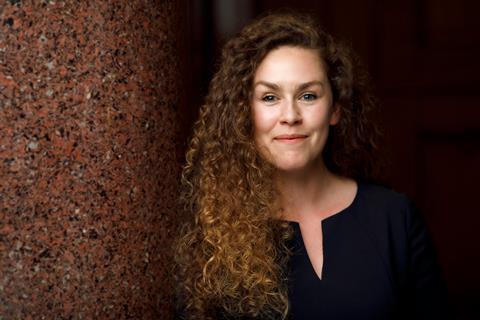
Her new firm’s in-box is much wider than SEN, Sweeney notes: ‘We’ve been involved in a number of cases where we’ve been challenging the government decision making over procurement during the pandemic… mainly PPE, but also in relation to the appointment of some senior roles and the cronyism that’s been involved, and more recently challenged the use of private emails.’
And of course, local and national government have made decisions responding to Covid-19 that have had an effect on the firm’s disabled clients. ‘That’s included the challenge to the downgrading of rights for children of SEND, and also the use of social care easements and the prioritisation of medical treatment.’
Sweeney knows from personal experience that such ‘busy’ times, combined with trying to act for clients in a desperate position, takes a toll on solicitors, and she is a vocal advocate for the profession to take the welfare of its members seriously. Among her volunteer roles she is chair of the Law Society’s Mental Health and Disability committee.
‘I look back to a very early stage of my career, there was almost no discussion around mental health and wellbeing of solicitors at all,’ she says. ‘People wore their busyness as a badge of honour. Particularly, I think, for public lawyers, there is a tendency that you’ve got to be busy to be good at what you do. And we obviously are motivated by our clients.’
But lawyers need to know how to look after themselves too, she says: ‘Personally, I suffered from burnout… at probably a far too early stage of my career than I ought to have done and was very unwell with my mental health for a period of time.’
Health and wellbeing
‘I think wellbeing is definitely a much more important part of a firm’s agenda now, but it’s got to be meaningful. It isn’t enough just to run a yoga class at lunchtime, you can’t just write it down in your statement of values, it’s got to be part of your culture. And I think that’s going a step further than perhaps what we’re seeing at the moment. A really, really important part of [Rook Irwin Sweeney]’s commitment to wellbeing is that we really wanted to mean it when we say we care about wellbeing, and not just be tokenistic.
‘So, we have a clinical psychologist do a monthly reflective practice session with us to help talk about some of the more challenging emotional aspects of the work we do, and to be checking in and making sure that we’re all feeling well. We have an unlimited annual leave policy and a flexible working policy – all part of trying to readjust this balance. We all work really hard still, but making sure that we do that in a way where we stay healthy. We don’t have chargeable time targets, which I think is another driver behind creating bad practices in terms of working cultures.’
We close by reflecting on evidence that the efforts in public law make a difference. What, in particular, happened to some of her early formative cases?
She talks about ‘one of my very first clients when I qualified – he was a child with autism and I secured him a home education package because he was really struggling to attend school.’ Earlier this year, the boy’s mother got in touch ‘to say he just got into university, and it was wonderful to hear’. She adds: ‘You do hear from time to time that your clients have got Saturday jobs or paid employment and it’s always really lovely to hear how they’re getting on.’
And the early cancer treatment patient who set Sweeney on her public law course? ‘At the point we started acting for him, he’d been told he only had a couple of months to live, and then we got him the life-saving drug and he went on to live another couple of years.’
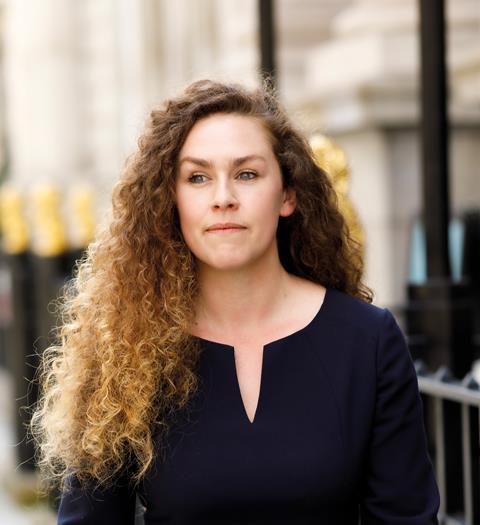
Photography: Darren Filkins























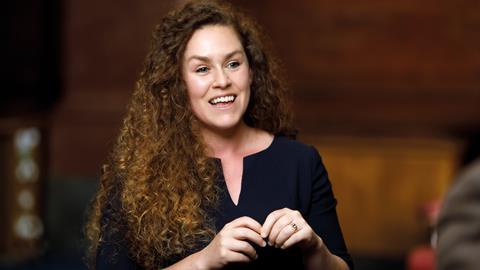













No comments yet